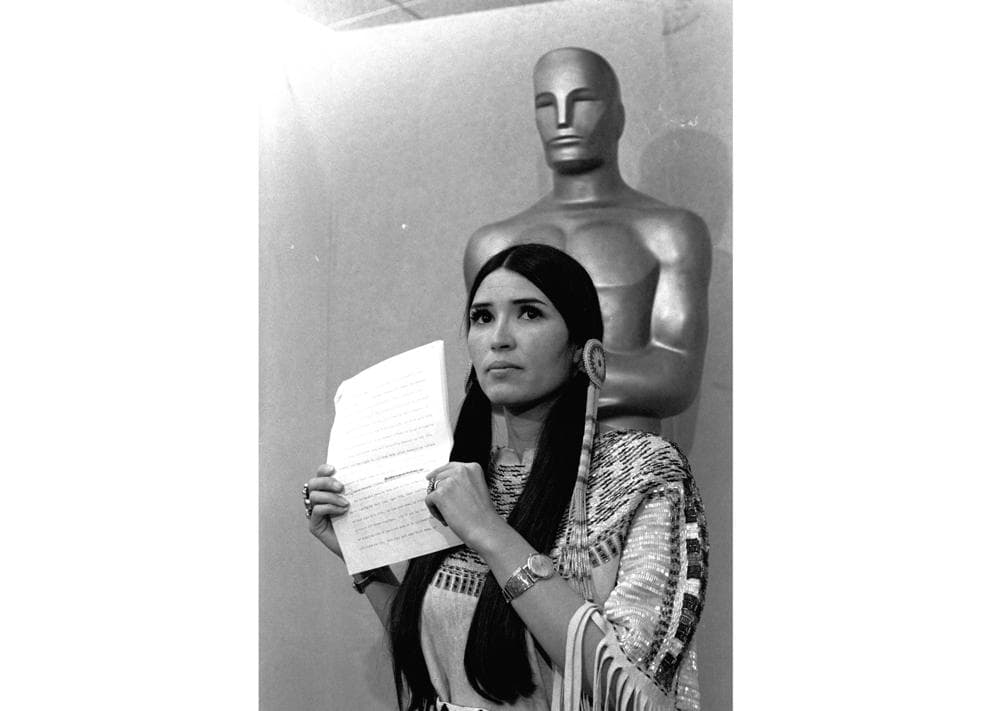WASHINGTON, D.C. — A memorial Mass is set for Oct. 21 for Sacheen Littlefeather, the woman whose appearance at the Oscars ceremony nearly 50 years ago provoked much outrage at the time.
The Mass will be celebrated at St. Rita Church in Fairfax, California. The pastor, Father Kenneth Weare, confirmed that Littlefeather was Catholic.
“I spent an hour with her the day before she died,” Weare told Catholic News Service Oct. 11. Littlefeather, 75, died at her home in Novato, California, Oct. 2 after having battled breast cancer for four years.
Littlefeather sparked outrage at the 1973 Oscars when, after Marlon Brando was announced as the Best Actor winner for his role in “The Godfather,” she was announced as “accepting the award” for Brando. But Littlefeather, wearing American Indian dress, did not accept the award.
Instead, she said Brando was rejecting it and spoke for about a minute about Brando’s Oscar boycott due to Hollywood’s portrayal of Indians.
Stepping in and accepting an Oscar on someone else’s behalf was rare in itself. But the rejection of an award and an Oscar boycott was unprecedented. The audience at the Dorothy Chandler Pavilion in Los Angeles responded to Littlefeather with a mixture of boos and cheers.
Littlefeather, who herself was trying to win acting roles, found doors shut to her. She wasn’t blacklisted, she said later. “I was red-listed.” The most recognizable movie in which she had a part that didn’t go uncredited was 1974’s “The Trial of Billy Jack.”
In June of this year, the Academy of Motion Picture Arts and Sciences, which runs the Academy Awards, sent Littlefeather a statement of apology.
“The abuse you endured because of this statement was unwarranted and unjustified. The emotional burden you have lived through and the cost to your own career in our industry are irreparable. For too long the courage you showed has been unacknowledged. For this, we offer both our deepest apologies and our sincere admiration,” wrote its then-president, David Rubin.
The statement was read in full at “An Evening with Sacheen Littlefeather” Sept. 17, an event honoring her. “She was happy that they made an official apology to her after all these years,” Weare told CNS.
Born Marie Louise Cruz in Salinas, California, in 1946 to a mother of European heritage and a father with Native American ancestry, Littlefeather said her mother once walked out on her father and took her to live with her maternal grandparents, who lived next door.
Although she described her father as physically abusive, she later took the name Sacheen because he often called her “my little sacheen.”
While in college in California, she looked more deeply into her American Indian heritage and became an activist, even in 1970 participating in the occupation of Alcatraz Prison, although she could not do so full-time because she was a student.
A protest group, Indians of All Tribes, occupied the prison from November 1969 until June 1971 to focus the nation’s attention on the situation of Native peoples in the United States.
She acquired the surname Littlefeather due to the feather she wore in her hair at that time.
Littlefeather also worked as a model and a radio reporter in California before trying her luck in Hollywood. Once roles and auditions dried up following her Oscars appearance, she continued her activism in California and Seattle.
In the 1980s, she led prayer circles for Kateri Tekakwitha, who later became the first Native American Catholic saint.
A 1987 profile of Littlefeather stated that she was a recipient of the 1986 Traditional Indian Medicine Achievement Award for her participation in the Traditional Indian Medicine Program at St. Mary’s Hospital in Tucson, Arizona, part of the Carondelet Health System.
St. Mary’s received an Achievement Citation from the Catholic Health Association in 1986 for its application of traditional Indian medicine’s role in health care.















